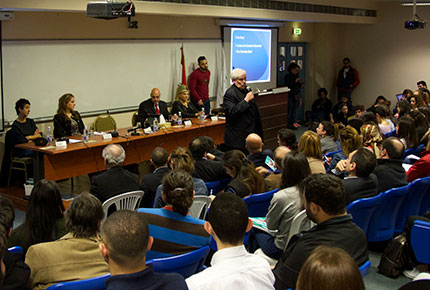Veteran CNN reporter shares skills with students
Budding journalists from LAU and outside gather to listen to Jim Clancy’s experience and invaluable advice.

The event was organized by the School of Arts & Sciences in collaboration with the May Chidiac Foundation.
“Pen, paper, phone and passion, these are the core resources required,” said veteran broadcast journalist Jim Clancy to a packed audience of students on March 6. The budding journalists were treated to a presentation on the A-Z of the profession, followed by a no-holds barred question and answer session with the former CNN reporter.
“There was no internet when I started out. When we had an idea, we had to do research in the library, sifting through microfilm,” said Clancy. “We gained information from conversations with trusted people, and we still do. You have to nurture your sources, not only when you need them, but constantly.”
Clancy has four decades of experience as a broadcast reporter and has covered many conflicts, including in the Arab region. Among the professional memories he shared with the audience was one of a press conference with Ariel Sharon. “He was speaking at the Electricté du Liban building in Gemayze in 1982,” said Clancy. “I asked a question repeatedly and he kept trying to ignore it. They eventually escorted me out of the building and cancelled the press conference.”
Since first visiting Lebanon in 1982, Clancy has returned to the country and the region on numerous occasions. His support for the Palestinian cause is no secret. When asked by one student how he came to adopt this pro-Palestinian stance, he answered matter-of-factly: “through years of reporting on the situation.”
Asked about the effects of Israeli lobby groups on journalism and impartiality, Clancy admitted that “the number of lobby groups in the U.S. has dramatically increased and they do create pressure, but they don’t dictate the story. Propaganda exists on all sides and it is our job as journalists to present a story from multiple viewpoints.”
In addition to presenting extensive skills-based tips for budding young journalists, Clancy addressed concerns about impartiality and accountability in media. “All media channels must be disassociated from political parties,” he averred. “Media should make an effort to educate, not promote a particular party, and personal defamation laws must be abolished.” LAU graduate Karma Khayat, vice chairperson of Al Jadeed TV, agreed. Seated next to Clancy, she echoed the sentiments of many in the room who complained about the extreme difficulty Arab journalists face in impartial reporting.
Also seated next to Clancy were Monika Halkort, visiting assistant professor at LAU’s Department of Communication Arts, Sami Baroudi assistant dean of the School of Arts & Sciences, and celebrity Lebanese journalist May Chidiac, who knows all too well the risk of pursuing critical independent journalism in Lebanon.
“I called him as soon as I heard he had left CNN,” said Chidiac, whose May Chidiac Foundation organized Clancy’s visit to Beirut. “I knew that finally my old friend and colleague would have some time to spare.” Fortunately for LAU’s students, he did, and they took full advantage of Clancy’s presence and expertise, firing question after question at the reporter.
More
Latest Stories
- Quality of Life on Hold: Multiple Sclerosis Care During Lebanon’s Economic Crisis
- AKSOB Launches Three New Executive MBA Certificates
- Blending Coding Education With Career Exploration
- LAU Alumnus Helms Seminar on Entrepreneurship and Sustainability
- On Point Celebrates Student Innovation and Commitment to Accreditation
- LAU Kicks off the Seventh Season of the Jr. NBA League
- Bridging Policy, Science and Society to Tackle Lebanon’s Environmental Challenges
- Understanding a Core Security Gap in Drone Operations

